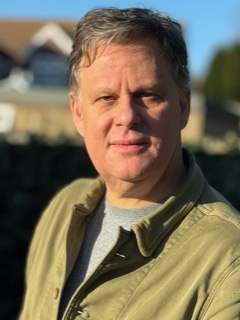
Deafinitely Theatre’s The Promise is due to set off on tour next month, taking in Birmingham, Newcastle, Manchester before finishing with a run at London’s Lyric Hammersmith. The play is inspired by the experiences of deaf people living with dementia and is written by Paula Garfield and Melissa Mostyn.
The production combines British Sign Language, creative captions and English and features a cast that includes Anna Seymour, James Boyle, Erin Hutching and Louis Neethling, a deaf director, producer, actor and presenter who directed the BBC’s first sign-language drama Switch. Neethling’s acting for theatre work includes See No Evil and An African Tale. Ahead of the tour, we caught up with Neethling to find out more about the play and the work of Deafinitely Theatre.
Q&A with Louis Neethling
What’s it like to be starring in world premiere of The Promise?
It’s both exciting and terrifying to be a small cog in the production of The Promise. Exciting because I get to perform Paula Garfield and Melissa Mostyn’s new script and collaborate with such a great cast and crew, but terrifying, actually I probably mean exhilarating, to be challenging myself this year.
What can you tell us about the play?
The play explores how dementia impacts upon a deaf family’s relationships with each other and where we see supressed grievances rising to the surface.
How have you approached playing Mike?
I have drawn upon my own personal experience of growing up in a deaf family and being part of a deaf community, of the people I have met there from all walks of life, and who have experienced social and educational deprivation. Moreover, how these deprivations can in some cases lead to certain prejudices. I have researched the social and geographical divisions in the UK in 1980s, and more specifically life for deaf people in 1980s with regards to schooling, BSL, and the deaf community.
Just how important is the work Deafinitely Theatre is doing in the industry?
Deafinitely Theatre matters – it matters that stories about deaf people by deaf people and produced and performed by deaf people, have a home, a safe space, a place where their voice is the loudest voice, and is always heard. Where creative ideas can be developed, tested, performed, and where audiences know they will see a good show. A hub for existing and new talent with opportunities for training and mentoring.
What do you hope audiences take away from the play?
I hope this play will start a dialogue within the deaf community and beyond with regards to the UK’s ageing population, how research is needed within different sectors of the UK ageing population – that there is no one typical person with dementia – they are all individuals with different individual needs. And finally, that there is empathy and support for the families, the friends, the carers, the people ‘left behind’ when someone they love has dementia or Alzheimer’s.














